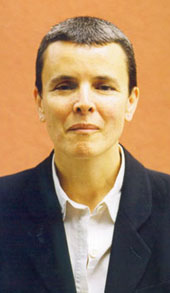 Today's poet was only an incidental reference to me at first, an attribution ("after Pura López Colomé") by the American poet, Michael Palmer, but I thought, if Michael Palmer is writing a poem "after" someone, particularly someone whom I've never heard of (as opposed to those that I have, like Carlos Drummond de Andrade, say), who must that be? And so what a revelation it was the first time I came across this major contemoporary Mexican poet's work, in translation by another great American poet, Forrest Gander (who was also a wonderful colleague some years ago), in the Australian-international online literary journal Jacket. Forrest's book of translations of her work, No Shelter: Selected Poems of Pura López-Colomé, was published by Graywolf Press in 2002. Her work, which I imagine is quite difficult to translate, often hermetically explores the self in its multiplicities, her selves, in their relation to language and form, and the poems unfold like journeys in forms that at times appear to be making themselves afresh. Here, then, is a poem by López Colomé, a little lyric fable of sorts with a bitter end, titled "Prism" (from Jacket):
Today's poet was only an incidental reference to me at first, an attribution ("after Pura López Colomé") by the American poet, Michael Palmer, but I thought, if Michael Palmer is writing a poem "after" someone, particularly someone whom I've never heard of (as opposed to those that I have, like Carlos Drummond de Andrade, say), who must that be? And so what a revelation it was the first time I came across this major contemoporary Mexican poet's work, in translation by another great American poet, Forrest Gander (who was also a wonderful colleague some years ago), in the Australian-international online literary journal Jacket. Forrest's book of translations of her work, No Shelter: Selected Poems of Pura López-Colomé, was published by Graywolf Press in 2002. Her work, which I imagine is quite difficult to translate, often hermetically explores the self in its multiplicities, her selves, in their relation to language and form, and the poems unfold like journeys in forms that at times appear to be making themselves afresh. Here, then, is a poem by López Colomé, a little lyric fable of sorts with a bitter end, titled "Prism" (from Jacket):Prism
Those coveting health —
I saw them making their way along the worn path,
the one trailing away from the city,
a part of the world,
a part of my own wounded humanity,
a sweet apparition for whomever awaits
me, living within but apart from me,
in my thirst, in my shifting
moments of trouble and peace.
I was them. I was myself.
They ascend toward Chalma, the pilgrims. Knowing that, on the way, their dry branch will break into blossom. Most are young. They carry water, a sleeping pallet, their daily lives. A few elders. Children on their shoulders. The sanctuary in search of its premises.
At once, with a single question,
their old age woke up in them.
For what do they petition
the Lord they worship,
a Lord whose body
is mortified by today’s exhaustion
and yesterday’s misery?
To be able to go on crying in fury or impotence,
to be able to sicken or to go beyond sickness,
to be able to testify to, to endure the terrifying absence of . . .
at the very core of the horn of plenty,
to be able to forget, yes,
the seven or eight year old ghost
impetuously flying without tail or string
by which it might be tugged back to earth,
to forget the future history,
the missing relinquishments to love.
That?
Oh, body, Lord and Master,
show me a tree made in your image,
synagogues, shrines, mosques,
filled out with your being.
They’ve made camp. Night. Groups of men over here, mixed groups over there, women with babies and children farther off. Around the campfires, standing, squatting. They share neither food nor coffee, each bringing out their own dinner, without making excuse for... and celebrating by sitting on the hard ground, letting the rocks bruise their thighs, nursing the baby in front of strangers. The warmth whelms from the nearness of arms, backs, necks, breasts; not from fire. From blood. There are those falling asleep, those about to, and those keeping vigil. None needs a roof.
All our fates
are measured out as breath
in the songs of stars.
A communion of luminous bodies,
I prayed in terror or envy,
a particular sequence,
a particular translation,
the joy of the indispensable.
Nothing more.
The next morning, full of admiration and rapture, I returned to those places, hoping to breathe in the last smells of what had been dreamt and shared. Going back as though to touch the votive stone, the feet or hands of the worn image of some miraculous saint:
I found nothing but garbage.
The Lord’s mouth agape,
his stinking breath.
Copyright © 2002, 2008, Pura López Colome, Translation by Forrest Gander, all rights reserved.









Thanks for this John. Palmer and Gander? This is definately someone for me to look into!
ReplyDeleteMos def!
ReplyDelete